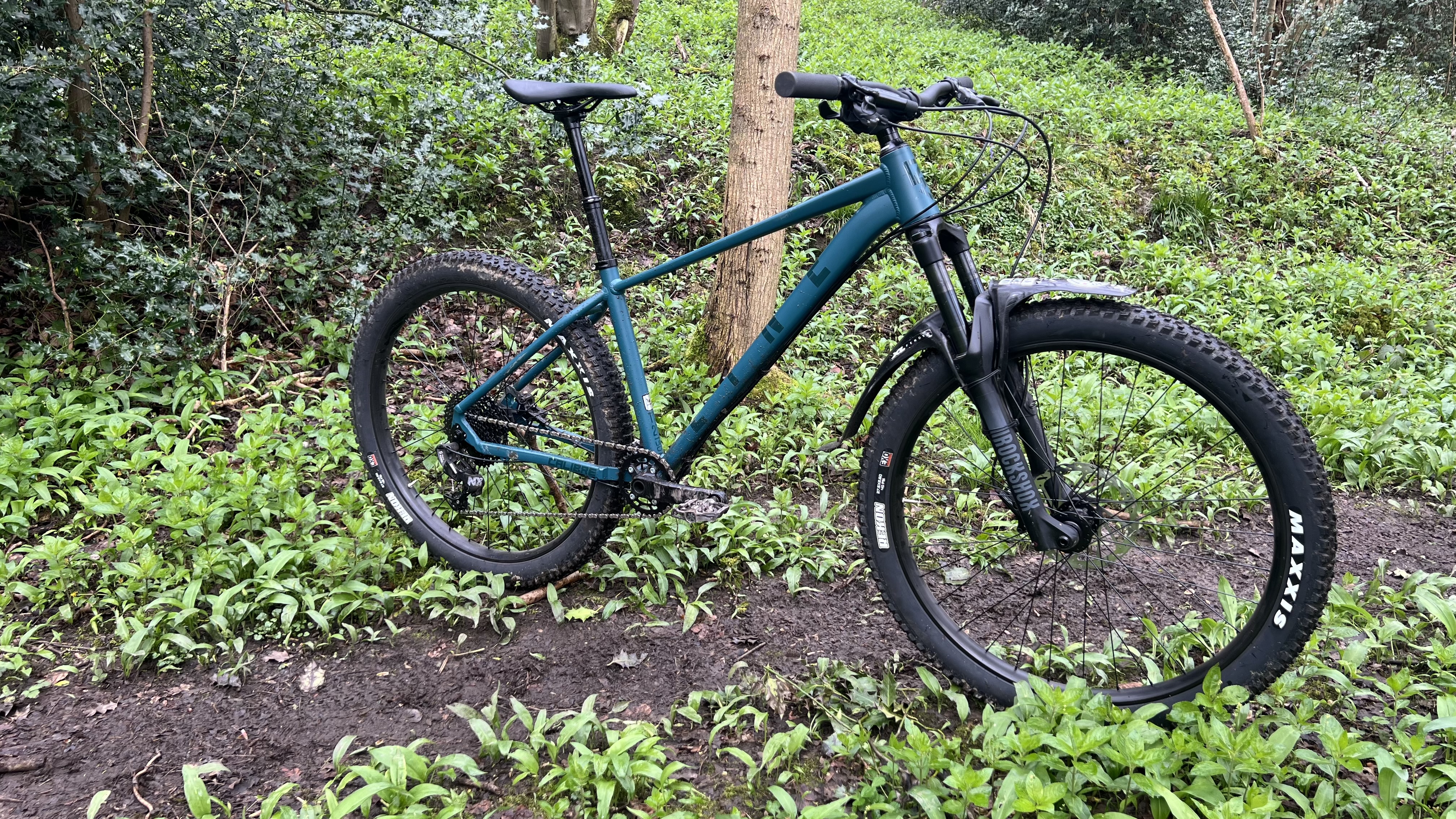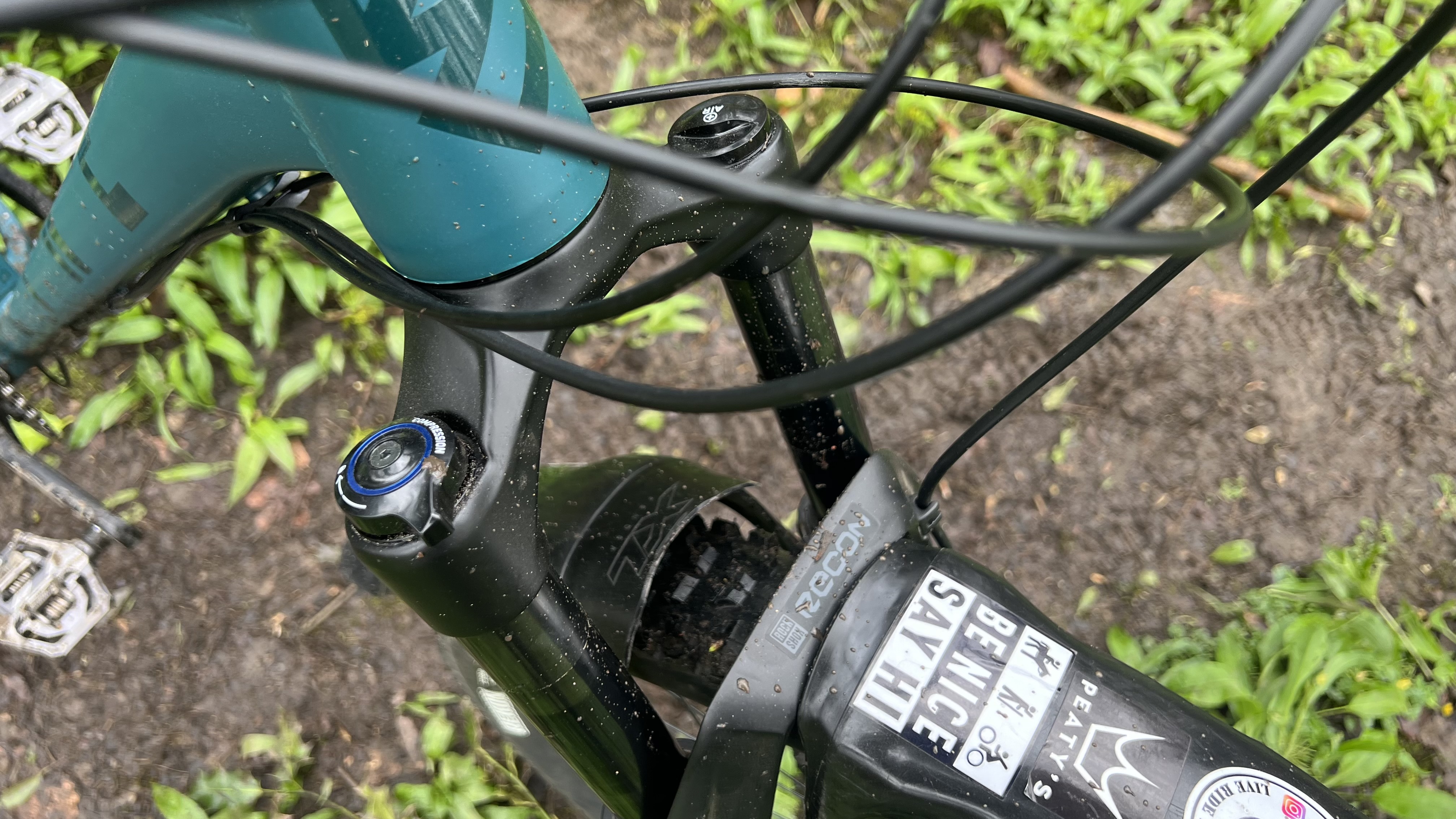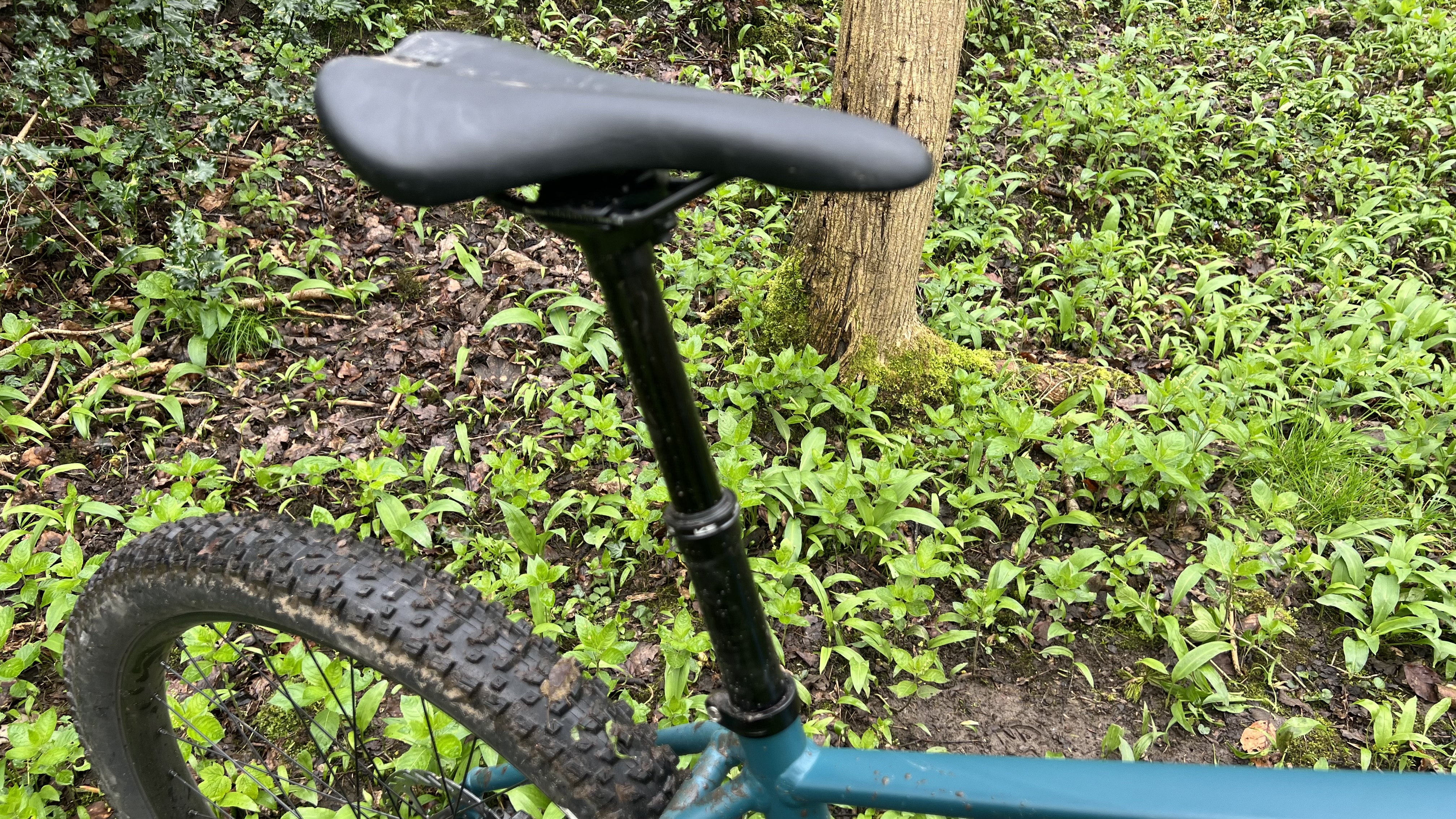
Calibre have always produced some of the best value mountain bikes and gravel bikes available. Not just on a component basis, but in terms of frame detail, geometry and ride quality. The Line T3 adds bang-up-to-date axle sizing for easy upgrading. But should you go for this £1,000 winner or are you better paying a bit more for bigger wheels or significantly less for a slightly older design?
Design and geometry
Some £1000 MTB designs don’t even deliver the basic ‘must have’ features for a budget mountain bike but Calibre go above and beyond. The head tube is tapered to allow for a stiffer fork without adding weight. The main tubes are shaped to manage stiffness and strength and the welds are all neat. The control lines are clamped to the underside of the downtube for easy servicing, but the seatpost cable gets a plastic entry seal which most cheap bikes miss out on. You might want to tether the rear gear cable where it loops sideways out of the chainstay though. The front of the driveside chainstay uses a plate rather than a tube for plenty of tire clearance around the big 2.6in tire. The rear axle is the latest 148 x12mm ‘Boost’ standard and bolts into replaceable frame ends. There are bottle cage bolts on the downtube and a bonus pair of bolts under the top tube for a direct mount inflator kit/mini-tool/frame bag, etc.
The geometry is similarly up to date with a 65-degree head angle and 475mm reach. The seat angle is contemporary rather than cutting edge at 75 degrees. The bottom bracket is 45mm lower than the axle centers and 430mm ahead of the rear axle. We'll get into what those numbers mean for the handling later, but it’s worth noting that the bike is built around 27.5in wheels, with the 29in wheeled Line T3 costing £100 more.

Components and build
The fork is a 27.5in model too, but even in the steel-legged ‘silver’ model, the RockShox Recon is excellent for the money. It’s air-sprung for easy adjustment for different rider weights or for how hard you ride. There’s rebound damping adjustment to match bounce back speed to spring pressure, and a compression damping lever to make it stiffer on climbs. It’s also got a tapered steerer to make the most of the frame advantage and a Boost 110x15mm bolt-through axle. Having these latest standards not only increases stiffness and control now, it also gives you a full menu of future suspension and wheelset upgrades later.
The current rims are extra wide to fatten up the 2.6in tires and they’re tubeless compatible so you can replace the inner tubes with screw-in valves and sealant for a smoother, puncture-protected ride. They are heavy though which is where upgrading would be a win.
SRAM provides the 11-speed NX gears and Level brakes which are all functionally fine if not fantastic. The Calibre chainset uses external bottom bracket bearings for stiffness and again that makes upgrading easy. While the steel chainring adds weight and a risk of rust, it’ll last a lot longer than an alloy ring in terms of wear.
The bars and stem are unmarked which means a completely symmetrical setup might involve a tape measure, but at 780mm wide with a 45mm stem length they’re a great match for the slack steering geometry. 31.8mm diameter means they’re not overly stiff and you get clamp-on grips in a soft compound for extra control and comfort. Even with a short 125mm stroke (some posts have up to 240mm drop), the KS Rage-i dropper post is a big control boost too and would cost £130 to add after buying.

Ride, handling and performance
Being able to drop the saddle out of the way on descents or technical trails is crucial to unlocking the benefit of the rest of the bike. Chief among these is the geometry as that’s something you can’t upgrade later if it’s rubbish. The Line T3 275's head angle, bar width and reach give a great baseline stability in slippery, steep or speedy situations. The short stem gives the light touch and responsiveness to tweak the right side of a rock or root in an instant or snatch back traction if the front wheel slips. The ‘steeper than most cheap bikes’ seat angle stops the Line lifting its front wheel on hard climbs. The bottom bracket is low enough to feel stable rather than perched in turns or technical moments without smacking the ground too often when pedaling. The 430mm chainstays are short enough for tight turns without making the bike skip and slip under power. In other words, the whole bike just centered me really nicely for confidence wherever I was riding.
While the frame itself is as solid in feel as I expected for an affordable alloy bike, Calibre’s component choices add extra smoothness. The RockShox fork is excellent for the price, especially as it’s so adjustable for rider weight or as you build up the confidence to hit stuff harder or send bigger drops. 140mm of travel is about as much as you can use without the rigid back end beating the snot out of you too.
While their heavy weight dulls acceleration, the extra wide 35mm rims mean you can run the wider than average Maxxis tires at lower pressures. Even with tubes in I didn’t puncture at 20psi and if you convert them to tubeless (kits are about £20), you could potentially go even softer if you’re a light rider (I’m 154lbs / 70kg) on smoother trails. That not only helps soften the blows from any lumps and bumps on the trails it also improves traction over rocks and roots. If I was running this bike as my own, I’d probably fit a toothier front tire for the winter months. The Rekons are rapid rubber that are fine for summer and gravel but need subtle braking and steering to keep them connected in wet or sloppy conditions.
That does highlight the fact that the SRAM Level brakes are a bit numb and low on power, but we wouldn’t expect better for this price and I’ve certainly ridden worse on more expensive bikes. Because they’re a big brand, brake spares are easy to find. SRAM provide NX shifters and rear mech for the 11-speed gearing, with a medium range 11-42 tooth cassette from Sunrace and a KMC chain. That means less gears and harder work on super steep climbs than a totally up to date 12-speed setup with 10-52 cassette. You’re simply not going to get those at this price though and a lot of bikes at this budget are still using 10-speed gears.
That leaves the only potential issue is the question of wheel size. While the 27.5in wheels and tires are easier to flick around on the trail and turn in tighter than 29in wheels they don’t roll over stuff as smoothly. That’s especially true with Calibre, as unlike most brands, they still fit the same wide 2.6in tires to the bigger 29er wheels. The 29er version of the Line T3 also has upgraded SRAM Guide rather than Level brakes. It’s a totally different frame too, so while steering and seat angle are basically the same the bottom bracket is dropped to keep the same stability values. That bike is £100 more though.
Alternatively, if you don’t think you’ll want to upgrade wheels or need big tires and 140mm of fork travel, the Line T2 27.5in uses an older frame, with 120mm RockShox fork and Shimano Deore 10-speed for £800. That doesn’t get a dropper though and geometry isn’t as rad either, so it’s definitely better suited for simpler riding.

Verdict
I almost feel bad throwing a couple of different options into the ring here, because for £1,000 the Line T3 27.5 is unbeatable. The closest competition you’ll find is the Boardman MHT 8.9 for £1,050 but while that’s lighter and faster, with 12-speed SRAM on 29er wheels you don’t get a dropper post and the angles and 120mm fork travel are much more XC biased. The equally trail-shaped, 27.5in wheel Sonder Transmitter SX costs at least £1,149 without a dropper post too.
But while component comparison will always be part of the cost analysis, where the Calibre scores is being a brilliant package to just jump on and ride hard straight away without ever thinking about the price. The fact all the components use the latest fit standards is a massive win in terms of upgrading and therefore long-term ownership. Or to flip the thinking, if you want a fancier frame you can just port all the parts over to that. Again, if you can spare the extra £100 for the T3 29er that would give you more options there too, so consider the ultimate payback of pushing past three figures carefully.
Test conditions
- Surface: Everything from road to loam, roots and loose rock
- Trails: Fire road gravel, natural XC, red and blue grade trails center and off-piste play trails
- Weather: Wet, damp, soggy, liquid slop with occasional islands of grip and enjoyment. 3 - 12 degrees C
Tech specs: Calibre Line T3 27.5
- Price: £999 (with GoOutdoors membership card for £5)
- Discipline: Trail
- Head angle: 64.5 degrees
- Frame material: 6061 alloy
- Fork: RockShox Recon Silver RL 140mm travel
- Sizes: S, M, L, XL
- Weight: 14.51kg (size large tested)
- Wheel size: 27.5in
- Chainset: Calibre 170mm crank, 32T Narrow-wide chainring with external bottom bracket.
- Rear mech: SRAM NX 11-Speed
- Shifter: SRAM NX 11-Speed
- Cassette: Sunrace 11-speed 11-42T
- Brakes: SRAM Level T, 2-piston hydraulic disc brakes with 180/160mm rotors
- Tires: Maxxis Rekon 27.5” x 2.6”
- Wheels: 35mm wide, 32h, alu double wall, tubeless ready rims on Formula Boost disc hubs
- Bars: Calibre Trail, Alloy 780mm wide, 20mm upsweep, 6°backsweep, 31.8mm clamp
- Stem: Calibre Trail, 45mm long, 31.8mm
- Grips: Calibre Trail, Single lock-on, soft compound
- Seatpost: KS Rage-i Dropper post, 125mm travel
- Saddle: Calibre Trail, steel rails







